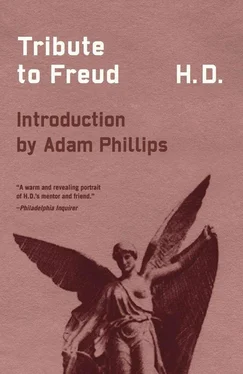Dr. Ellis was in my fantasies when I went, July 1919, with Bryher to the Scilly Isles. He knew Cornwall and had lived there off and on, for many years in “retreat” as Daphne would have said, working on his famous volumes. The Scilly Isles, in the flow of the Gulf Stream, suggested the Mediterranean to me. There were great birds; they perched there in “retreat,” at certain seasons, both from the tropic zones and from the Arctic. It was here at this time I had my “jelly-fish” experience, as Bryher called it. There were palm-trees, coral-plants, mesambeanthum, opened like water-lilies the length of the grey walls; the sort of fibrous under-water leaf and these open sea-flowers gave one the impression of being submerged.
We were in the little room that Bryher had taken for our study when I felt this impulse to “let go” into a sort of balloon, or diving-bell, as I have explained it, that seemed to hover over me. There was an old-fashioned sideboard and I remember thinking, “I must really ask for another jar to put those flowers in.” They had stuck a great bundle of calla-lilies, wedged tight into a jam pot. Two or three of the flower-stalks would have been more effective, with a few of the spear-like leaves. There was an engraving of the inevitable Landseer’s Stag at Bay over the fireplace, screened now with a ruffle or fan of red paper. When I tried to explain this to Bryher and told her it might be something sinister or dangerous, she said, “No, no, it is the most wonderful thing I ever heard of. Let it come.”
I tried to write a rough account of this singular adventure, Notes on Thought and Vision. There was, I explained to Bryher, a second globe or bell-jar rising as if it were from my feet. I was enclosed. I felt I was safe but seeing things as through water. I felt the double globe come and go and I could have dismissed it at once and probably would have if I had been alone. But it would not have happened, I imagine, if I had been alone. It was being with Bryher that projected the fantasy, and all the time I was thinking that this would be an interesting bit of psychological data for Dr. Havelock Ellis.
When I returned to London, I sent my Notes to Dr. Ellis. I thought he would be so interested. But he appeared unsympathetic, or else he did not understand or else he may have thought it was a danger signal.
Dr. Ellis did not understand but the Professor understood perfectly.
As I was leaving, the Professor asked me, “Are you lonely?” I said, “Oh — no.”
No, I was not lonely. There were museums, galleries, the walks in the Stadtpark, visiting old churches. I scribbled in my notebook, and leafed over magazines and books sent me from London and America. It did not occur to me, until I was back in my bed, that I had omitted to tell the Professor the story of the caterpillar that had so concerned me last night before falling to sleep. Now, I must assemble the picture again.
Where had I left off? There was some snag somewhere. There were, now I recalled, several snags. To begin with, I had got my father’s birthday all wrong. Why substitute March for November, but the four was right; yes, I was certain that November 4 was my father’s birthday.
That caterpillar? No, it would not scratch and beat with its wings inside the box, for surely when it had woven its shell, I would have left the box-lid off altogether. Why this box and box-lid? There is that rather gruesome old print in the Professor’s waiting room, called “Buried Alive.”
I must have taken fresh leaves one day and found the spun sheath. But how long did it take a caterpillar to weave its elaborate vestment? Why did I forget the caterpillar? Why did I remember it?
There it is on my table, that last volume that I disliked so. It was sent to me from London, another fanatical woman writing her story of D. H. Lawrence. Lawrence? It was in March he died.
Then I substituted my father’s birthday for the death-day of D. H. Lawrence.
March 5
I had said, in the beginning, that I only wanted to tell the story, it was like the Ancient Mariner, but he did not know or pretended not to know the poem. I had connected the Ancient Mariner with the Bible as an uncle had a Doré illustrated edition that we laid flat on the floor, in my grandmother’s house, as we did at home our own illustrated Bible, before we could read. I connect Poe and Coleridge in my sequence, as they were both alleged drug-addicts, Poe with his Lenores and haunted Ushers, and Coleridge with his Xanadu, his Kubla Khan. I was publicly reproved at Miss Gordon’s school in West Philadelphia, when I was fifteen, because I firmly stated that Edgar Allan Poe was my favorite among American writers. I was told by Miss Pitcher who had otherwise encouraged me, even at that age, in my literary aspirations, that Poe was not a good influence, he was “unwholesome, morbid.”
Today, lying on the famous psychoanalytical couch, I have a feeling of evaporating cold menthol, some form of ether, laid on my “morbid” brow. Wherever my fantasies may take me now, I have a center, security, aim. I am centralized or reoriented here in this mysterious lion’s den or Aladdin’s cave of treasures.
I am salvaged, saved; ship-wrecked like the Mariner, I have sensed bell-notes from the hermit’s chapel. There is Baudelaire too and his Fleurs du Mal, but there is no evil in Sigmund Freud. Full fathom five thy father lies, of his bones are coral made, those are pearls that were his eyes, nothing of him that doth fade, but doth suffer a sea-change into something rich and strange, I whisper under my breath, in one of those pregnant pauses, while the fumes of the aromatic cigar waft above me, from the nook in the corner behind my head.
Are we psychic coral-polyps? Do we build one upon another? Did I (sub-aqueous) in the Scilly Isles, put out a feeler? Did I die in my polyp manifestation and will I leave a polyp skeleton of coral to blend with this entire myriad-minded coral chaplet or entire coral island? My psychic experiences were sub-aqueous.
I must remember to tell Sigmund Freud of Norman Douglas’ epigram on Havelock Ellis, “He is a man with one eye in the country of the blind.”
I do not want to talk today. I am drifting out to sea. But I know I am safe, can return at any moment to terra firma. Yes, there was a dream last night but the ramifications are too elaborate. I dreamt I sent my book Hedylus to Peter Van Eck, whom I met on the boat going to Athens, spring 1920. I will have to tell him about the book, Hedylus the Alexandrian poet who is mentioned in the Garland of Meleager, and Hedyle his mother.
I will have to tell him that Bryher came into this dream, disguised at a Halloween party, as a black cat, actually as Peter whom my daughter says she has left me in her will. Puss-in-boots?
No, I could not tell him about Hedylus. What had I told him? I had not told him of the caterpillar, that is certain.
I was annoyed with that last book on Lawrence, but it gave me that date. It was March 2nd, not far removed from 4, and 2 × 2 is 4, and will we ever lay a four-square foundation?
Why lay a foundation?
I wasn’t fair but I could hardly cope with his enormous novels. They didn’t seem to ring true. That is, I was not susceptible to the frenzy in them. In them? Or in the choros of Maenids? I do not like that last book. I have not liked any of these books that have come out since his death. What do they know of Lawrence?
I should talk to the Professor about Lawrence, but I was particularly annoyed by his supercilious references to psychoanalysis and, by implication or inference, to the Professor himself.
The Man Who Died?
Читать дальше











